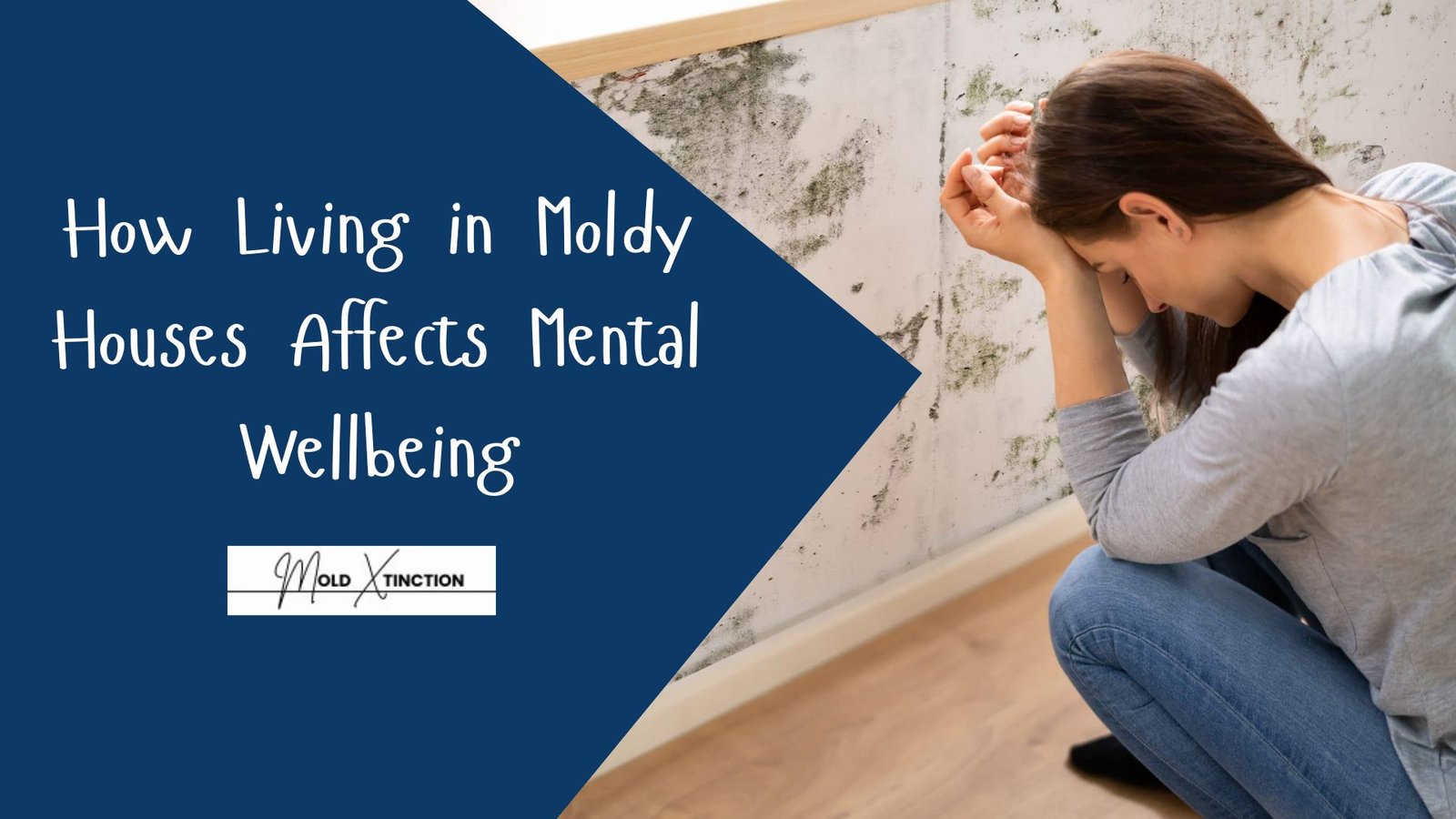How living in moldy houses affects mental wellbeing is what a lot of us may not be aware of. Do not let it get to you; it is not a joke, it is real.
It is not a secret that when people are exposed to mold, they get sick in the form of sneezing, coughing or even getting allergies.
Yet, what might not be obvious to you is that mold in the house can influence your psychological well-being. It’s what most people are oblivious of. Even though mold makes your body feel sick, it can also change your mood internally, both psychologically and emotionally.
It is not only your physical health that becomes ill when you are residing in a house that has mould. It is also capable of depressing you, leaving you exhausted, stressed, or anxious. Some people can be so confused, forgetful, or lack concentration.
Such mood swings and thought changes are usually associated with exposure to mold, especially when you’re breathing in mold without even realizing it.
This article will explain the effect of these molds on your mental health (mind), not just your body.
You should first consider the effect of living in moldy houses on mental health and what can be done to stay safe and sound.
Let’s look into it a bit closer.
What's In This Article
ToggleHow Does Mold Affect the Body?
Before we talk about the mind, let’s remember how mold affects the body:
- Sneezing
- Coughing
- Itchy eyes
- Runny nose
- Skin rashes
- Asthma attacks
These are serious. But many people don’t notice that mold can also hurt your mental health.
How Living in Moldy Houses Affects Mental Wellbeing

1. Feeling Tired All the Time
When you’re in a house with mold, you can be tired all the time. It’s called chronic fatigue. This means your body lacks energy. You may still feel sleepy despite having a quality sleep at night.
Mold produces small poisons called mycotoxins. You can be exposed to these poisons through inhaling the air in your house. When they get inside, they can affect your brain and make you feel weak and slow.
2. Mood Swings and Depressed Moods
Mold can alter the process of your brain activity by emitting toxic substances that fill the air. As you inhale them, they may trigger chemical reactions in your brain.
You discover that your mood changes, and you sometimes feel sad. And sometimes your depression is a result of the psychological effects of mold if you find yourself in such an environment.
Again, when you’re exposed to mold for a very long time, it can have devastating effects on your mental and emotional health.
You may feel:
- Sad without reason
- Irritable
- Emptiness
- Want to cry
If you weren’t like this before you moved into your current house, it’s mold.
3. Fear and Anxiety
Another way mold affects mental health is through anxiety. You can start living in fear or feel nervous and stressed.
You might feel anxious about everything compared to before. Your heart might beat faster. When everything is fine you might think something is going to happen.
If you have developed anxiety since you moved into a damp or musty house then the hidden cause could be mold.
4. Brain Fog and Memory issues
Some people have mold in their homes and experience brain fog. This means they can’t think straight and many other things. This mental haze may manifest gradually and it might get worse the longer you’ve been in a moldy area.
You may:
- Forget things often
- Lose focus easily
- Feel confused
- Struggle to find the right words when talking
These signs show your brain is under stress probably from breathing in mold every day.
5. Trouble Sleeping
Mold is also a condition that makes one have trouble sleeping. Breathing in mold spores at night may disrupt your sleep and result to not having a deep sleep which causes fatigue and feeling exhausted the following day.
Although you sleep long hours the quality of your sleep will not be good which can affect your overall health and concentration.
You may:
- Wake up many times during the night
- Have strange dreams or nightmares
- Feel restless
- Wake up feeling tired instead of fresh
When sleep is affected your mental wellbeing suffers more.
6. Stress in the Family
Living in a moldy house doesn’t just affect one person. It can affect the whole family.
- Parents may feel tired and cranky.
- Children may get sick often or feel scared.
- Everyone may argue more due to stress.
A moldy home can feel uncomfortable. It may start to feel like a trap. Over time this can damage relationships and emotional health.
Signs There Might Be Mold in Your Home
Mold is not always visible to the eye but is smelly. It smells extremely strong and musty and its smell lingers somewhere in the air leaving the room damp or bad-smelling.
Such smell may be most noticeable in rooms that have been closed or in rooms where there has been no access to fresh air and ventilation for a long time.Look out for:
- A smell that lingers
- Stains on the ceiling or walls
- Damp walls or mossy walls
- Black or green on the wall Dark spots like
- Difficulty in breathing that goes away when you’re out of the house
Do something if you see any of these.
What to Do When There’s Mold in Your House
You can’t fix the mold on your own. Wiping it away with bleach or soap won’t work. The mold will come back if the moisture problem is not fixed.
Don’t Panic – Do this:
- Open windows and allow fresh air.
- Repair roofs and pipes that leak.
- Fan or a dehumidifier to dry out the air.
- Get rid of moldy items.
- Call a mold remediation company.
Why Call a Professional Remediation Service
Trying to eliminate mold on your own is hazardous. You’ll inhale toxic spores. And if you leave even a little bit of it, the mold will come back.
A professional mold remediation company is trained to:
- Find the hidden mold in your home
- Remove all the mold safely
- Whatever caused the mold will be fixed
- Get your home safe and healthy again
Your mental and physical health will never be put at risk. Leave it to the pros.
Conclusion
A moldy house is not just a physical health issue, it’s a mental health danger too. Mold won’t just make you cough or sneeze but it can also make you feel tired, nervous, cranky or depressed.
You may start to forget things, you may be unable to concentrate and sleep at night. These changes will affect your work, relationships and life.
Do you feel sick, tired or confused without a reason? The reason may be in your house, in your walls, in your ceiling or in your basement.
Don’t wait till the symptoms worsen. Your mental and physical health first.
Call a good mold remediation company now.
They will help you get rid of the mold and restore peace and health to your home.
FAQs – Quick Answers
Q: Can mold cause depression?
A: Yes, mold can cause depression. Mold produces toxic molecules called mycotoxin. These toxins can enter your body through the air you breathe, especially if you live in a house with air circulation issues and hidden water issues.When these toxins get in, they can affect the brain. You’ll feel depressed for no reason, lose interest in things you used to love or feel hopeless and tired.
That’s depression. If you’re suddenly hit with these feelings then you might have a mold problem in the house you just moved into or rented.
Most people don’t know that mental health is connected to indoor air quality but the connection exists and it’s a big one.
Q: Can I remove mold by myself?
A: Mould spots can be treated on harder surfaces like tiles and glass using soap, vinegar or bleach. Caution: Use gloves and mask.
Mold can only be cleaned personally when the spot of mold is very small and easy to reach. When the mold reappears or covers a very wide surface of the surface or even found on a soft material such as carpets, or wood and drywall, it is better not to handle it yourself.
Mold can also hide behind walls or underneath the floors which you can’t see. That’s why you should never hesitate to call a professional mold remediation company to get a thorough inspection and a safe clean up.
Q: What are the signs of mold on mental health?
A: Mold can have many effects on your mental state. You can feel fatigue and sometimes even feel exhausted even after you rest. You may feel unable to concentrate, have short memory, get anxious and moody without knowing why.
Others feel confused or sleepy. Provided that these symptoms began not earlier than the family moved into the house with a damp basement or the house with a musty smell, the concealed factor can be mold.
Watch out for signs such as spots of water, flaking of paint, or a rancid odor; these are the pointers that can be taken to mean that there is mold.
Q: Are children affected by molds as well?
A: Yes, children are more vulnerable to mold even more than we the adults. Some of the they experirnce easy rash of the skin, breathing complications, and most times they are unable to sleep well.
It is also able to impact mood, energy, and learning. Exposure to mold can make them cranky, tired, and sick more often. If they spend a long time in a moldy hous,e then their mental development may also be affected.
Start inspecting your home to see any signs of mold if you start noticing changes in your child’s behavior and health.
Helpful Guide: The Impact of Mold Exposure on the Reproductive Health of Women


